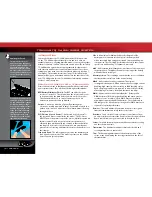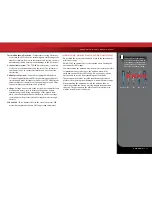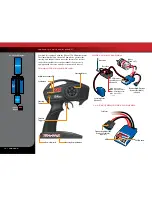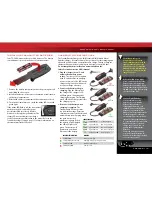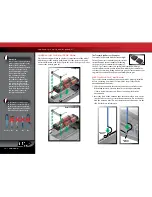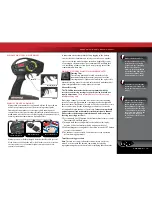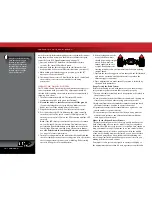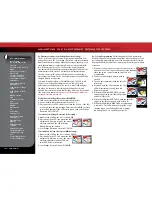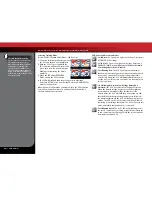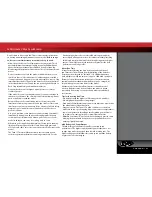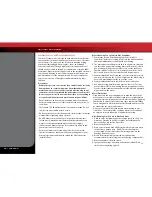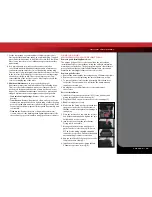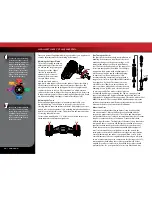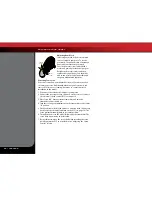
24 • TRAXXAS
To achieve a good starting
point for the slipper clutch
in these models, tighten the
slipper clutch adjusting nut
clockwise until the slipper
clutch adjusting spring
fully collapses (do not over
tighten), and then turn the
slipper clutch nut counter-
clockwise one full turn.
Do not run your model with
the slipper clutch adjusting
spring fully compressed. The
minimum recommended
slipper clutch setting is 1/2
turn counterclockwise from
fully compressed.
ADJUSTING YOUR MODEL
Once you become familiar with driving your model, you might need
to make adjustments for better driving performance
Adjusting the Slipper Clutch
The model is equipped with an
adjustable slipper clutch, which
is built into the large spur gear.
The purpose of the slipper
clutch is to regulate the
amount of power sent to
the rear wheels to prevent
tire spin. When it slips,
the slipper clutch makes a
high-pitch, whining noise. Remove the rubber slipper clutch plug
on the transmission cover in order to adjust the slipper. Use the
4-way wrench to turn the adjusting nut clockwise to tighten and
counterclockwise to loosen. Place the model on a high-traction
surface, such as carpet. Adjust the slipper so that you can hear it slip
for approximately two feet from a standing, full throttle start. (Learn
more about adjusting the slipper clutch in the sidebar left.)
Adjusting the Toe-in
Geometry and alignment specs play an important roll in your
model’s handling. Take the time to set them correctly. Set the
steering trim on your transmitter to neutral. Now, adjust your servo
and tie rods so that both wheels are pointing straight ahead and are
parallel to each other (0° toe-in). This will ensure the same amount
of steering in both directions.
For increased stability, add 1°-2° of toe in to each front wheel. Use
the turnbuckles to adjust the alignment.
Fine Tuning the Shocks
The four shocks on the model greatly influence its
handling. Whenever you rebuild your shocks or
make any changes to the pistons, springs, or oil,
always make changes to them in pairs (front or
rear). Piston selection depends on the range of oil
viscosities that you have available. For example,
using a two-hole piston with a lightweight oil
will, at one point, give you the same damping
as a three-hole piston with heavier oil. We
recommend using the two-hole pistons with a
range of oil viscosities from 10W to 50W (available
from your hobby shop). The thinner viscosity
oils (30W or less) flow more smoothly and are
more consistent, while thicker oils provide more
damping. Use only 100% pure silicone shock oil
to prolong seal life. The model’s ride height can
be adjusted by adding or removing the clip-on, spring pre-load
spacers. Adjust the ride height so that the suspension arms are
slightly above being parallel to the ground. Observe how the model
handles in turns. Proper set-up will add stability and help prevent
spin outs. Experiment with different springs and shock oils to find
what works best for your current track conditions.
Wheels and Tires
Many types of aftermarket tires and wheels can be adapted for
use on your model. Most will affect the overall width and the
suspension geometry of the model. The offsets and dimensions
designed into the model’s wheels are intentional; therefore, Traxxas
cannot recommend the use of other non-Traxxas wheels with
different specifications. The diameter of the wheels is an innovative
design, and there is a variety of different tires available for you to
experiment with in addition to the included tires on the model
(listed in your parts list). Experimentation with different types of
tires is recommended to see which ones work the best on the
terrain where the model is run. When selecting tires, consider the
overall diameter and the rubber compound (hard or soft). If the
overall diameter of the tire is significantly increased, you will need
to use a smaller pinion gear to compensate for the larger tire. Soft
compound tires with many short spikes generally work better
on hard, dry surfaces. In loose dirt, a tire with large spikes should
perform better. See your parts list for accessory wheels and tires.
1
°
-2
°
1
°
-2
°
0
°
0
°
Pre-load
Spacer
Tighten
Loosen

